A summer job in Maine is a pretty sweet gig.
While hordes of tourists flock to the landmarks and attractions that make up “Vacationland” – rugged coastlines, peaceful forests, renowned restaurants and quaint shops – there’s a lot of work happening behind the scenes to make the Pine Tree State a home, not just for summertime guests.
Amélie Pasco and Wren West get their hands dirty maintaining the community garden with the Brunswick-Topsham Land Trust.
Livie Richards milks and feeds the cows at Smiling Hill Farm. James Crowley spends his time on the water, harvesting and sorting the oysters that end up on restaurant plates.
And Tad Kane rents kayaks to those looking to cool off in the waters of Casco Bay.
Here’s a taste of some of the coolest summer jobs in southern Maine:
Livie Richards, cow farmhand for Smiling Hill Farm
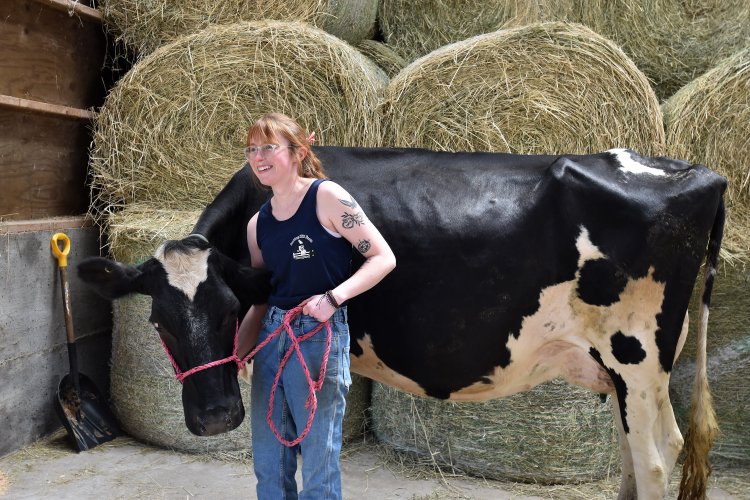
Dana Richie/Staff Writer
Livie Richards visited the heifers on a recent sunny afternoon, greeting each one individually.
“Hi, Strawberry Shortcake,” she said as the rusty cow gave her a lick. “Hi, Tiramisu,” she said to another.
“They’re my co-workers,” Richards said with a grin.
Richards, 19, is working with Smiling Hill Farm in Westbrook this summer as a farmhand. Monday through Friday, she arrives at the red barn at 5 a.m. to feed the cows hay and grain, clean their sleeping area, and make sure they are well.
On milking days, she hooks up four cows at a time to the machine and can get through 40 cows in about 2.5 hours. Her job is half milking and half other chores, she said.
“A lot of my job is cleaning up poop,” she said with a laugh. “But I know it’s for the animals’ well-being, so I don’t mind.”
Richards, who is from Old Orchard Beach, has always loved farm animals, so working at Smiling Hill Farm has been a “dream come true.” She’s starting at York County Community College in the fall and studying to be a veterinary technician.
When she started at Smiling Hill Farm two years ago, she worked in the barnyard with smaller animals. She gravitated toward the larger animals like sheep and goats and now works strictly with cows.
Over time, she’s built relationships with the animals. She recognizes their faces and their personalities, and she knows all of their names. She’s learned that cows really love bananas, so sometimes she brings in a bundle as a treat. Once they smell it “their ears perk up and they stick their tongues out,” she said.
James Crowley, oyster farmer at Maine Ocean Farms
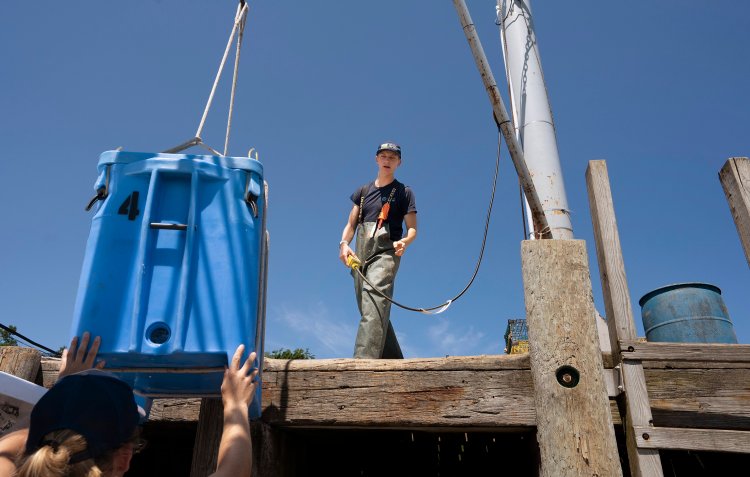

Gregory Rec/Staff Photographer
Biology is James Crowley’s favorite subject in high school. And this summer, the 17-year-old is learning all about oyster biology while working for Maine Ocean Farms in South Freeport.
“A lot of people maybe don’t know what it takes to get the oyster out of the water and onto their plate, but it’s very interesting,” he said.
His typical work day begins with a bike ride to the Freeport Town Wharf followed by a short boat ride with the rest of the crew to the 10-acre oyster farm.
On a floating dock amid the array of suspended bags of oysters, Crowley and the rest of the crew sort through each bag, ridding them of barnacles and mussels and picking the largest shells. The company grows two varieties: recompose, which are known for being “large and salty” and the wet smack oysters, which are smaller and sweeter.
After sorting, Crowley puts the oysters that have been de-barnacled and are large enough to be sold into new, clean bags. Local restaurants usually buy bags of 100, so Crowley said a lot of his job is “just counting seashells.”
When he started the job early this summer, he didn’t know the first thing about aquaculture or the seafood industry. He was surprised to learn that oysters start out as the size of a small seed.
The lifespan of an oyster is typically three years, he explained, and he’s gotten better at identifying the older ones.
“They just look kind of smooth and round and old,” he added with a chuckle.
Wednesdays are harvest days. Once they collect and clean up the oysters, they keep them nice and cold. “Did you know they’re living when you eat them in a restaurant?” he asked with wide eyes.
He hasn’t thought through his plans for next summer, but he’s thinking he might return.
Gerry Killarney, site manager and tour guide at Portland Observatory


Brianna Soukup/Staff Photographer
Gerry Killarney has been teaching for decades, but her classroom this summer is a little different.
The Portland resident and longtime middle school English teacher is now a tour guide and site manager at the Portland Observatory.
Each summer for the past four years, the 71-year-old has greeted visitors and taken them up to the top of the 1807 tower. She sees the job as a fitting progression from the classroom.
“Talking to a group of people and giving information is what I did for 30 years,” Killarney said.
In between visitors’ arrivals on a humid Sunday afternoon, Killarney described the building’s history with concision, including critical details but skipping over the superfluous bits. She tries to do the same on her tours.
“We’re not trying to give a lot of facts to people, a lot of dates,” she said. “We’re telling a story.”
She tells visitors before they climb the six-floor staircase that they are in an observatory, not a lighthouse — a common misconception, she has found, because the structure sits near the coast and resembles a lighthouse’s shape.
The observatory “never communicated with ships, which is what lighthouses do,” she said. “This was built to communicate with Portland merchants that a ship’s coming in, because our harbor is such that you don’t know a ship has arrived until two minutes before it gets here.”
For Killarney, her favorite part of the history is Captain Lemuel Moody and his family, who oversaw the observatory from its construction until it went out of use in 1923, when the invention of the two-way radio signal gave people on ships a way to communicate with merchants directly.
“Captain Moody built this place. … And then he built a bowling alley and a stable and a dance hall,” Killarney said, laughing. “He had a little enterprise going on.”
Tsoline Jerahian, camp counselor at Portland Pottery
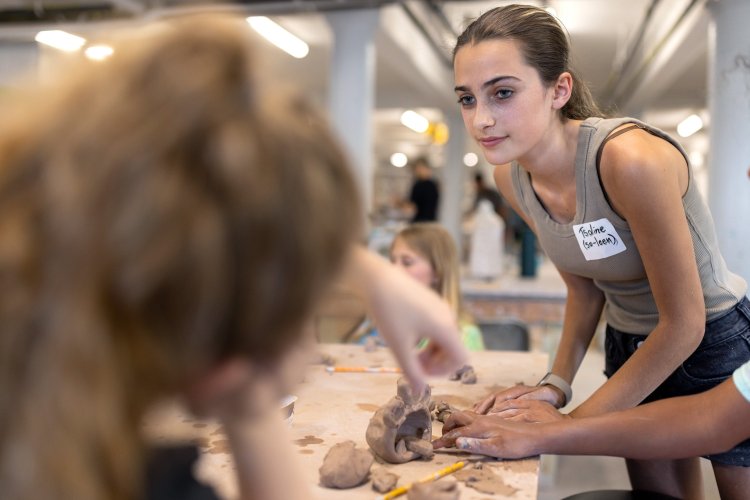

Brianna Soukup/Staff Photographer
Tsoline Jerahian molded her hands around a wet lump of clay. The 15-year-old from Cape Elizabeth rocked her foot on the pedal. The wheel spun and she methodically dug her fingers in. Within minutes, a bowl took shape.
Her job as a day camp counselor at Portland Pottery comes with free access to the studio, and she typically sticks around for an hour or two each afternoon to practice.
But that isn’t the only reason Jerahian thinks she has a great summer job. Each day, as many as 40 kids ranging in age from 6 to 14 crowd into her classroom. She teaches them how to use clay to make creatures like monsters and frogs, or throw small pieces on the wheel.
Then she makes them come to life with different glazing and firing techniques, like Raku, a technique in which the pottery is moved directly from the fiery-hot kiln into a pile of sawdust to give it a metallic finish.
It’s Jerahian’s second year as a counselor, but she was first a student herself. She came to the same camp when she was 11, and kept going back. She plans to return next summer.
Jerahian said she loves to watch campers’ confidence bloom throughout the week.
“When they start out on Monday, they’re frustrated,” she said. “During the next couple of days, they get more used to it.”
Sierra Hughes, Costume Shop Manager at Maine State Music Theatre
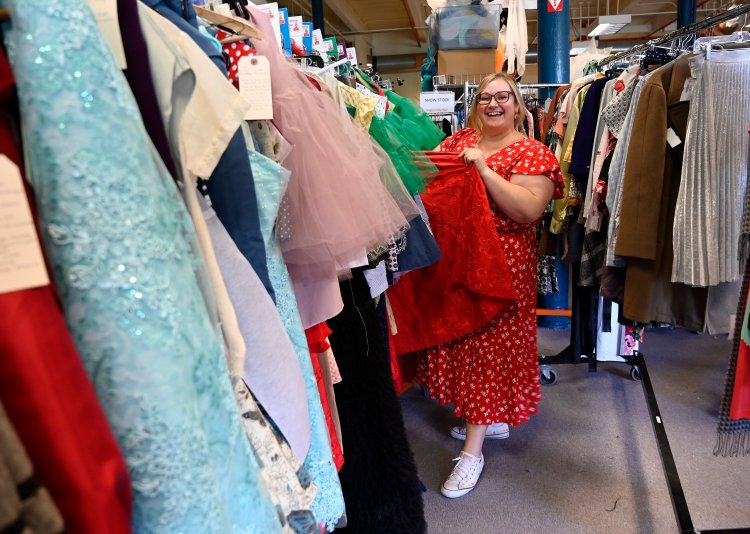

Shawn Patrick Ouellette/Staff Photographer
Sierra Hughes learned a lot about costume design as a college intern at Maine State Music Theatre. Now, eight years later, she is in charge of costumes for the theater’s summer musicals.
Hughes, 29, oversees the costume shop office, which overlooks the Androscoggin River from the second floor of Fort Andross in Brunswick. She is responsible for designing, fitting and building a costume for each actor in each scene in each of MSMT’s four musicals this summer.
Hughes said she relishes the scope of the job.
“I think what I like most about costume design is this thing called ‘effort-driven reward cycle,’ where you start something and see it to completion,” Hughes said. “I see it as a rendering (first), and then I get to have the very tangible thing at the end. … I can see the process through the entire way.”
With exact measurements and fittings for each actor, the costume shop puts a priority on making the actors feel comfortable in their costumes, Hughes said.
“Something I’m really passionate about is that the human doesn’t fit the costume; the costume fits the human,” Hughes said. “I feel like a lot of the time when people go into shops they’re like, ‘nothing fits me.’ They play the blame game on themselves. Whereas, in theater, it’s the opposite because it’s us who has to make sure it fits you.”
Hughes works in the costume shop at Pittsburgh’s Point Park University, her alma mater, during the school year. There and in Brunswick, what she loves most about the job is getting to teach and learn at once.
“It’s so nice to be in an environment with so many different brains coming in from different educations to be able to teach them how I did it,” Hughes said. “That’s what I like about summer stock (theater), is that there’s people coming from all over to be able to learn together.”
Maddie Corbett, yard attendant at Salty Dog
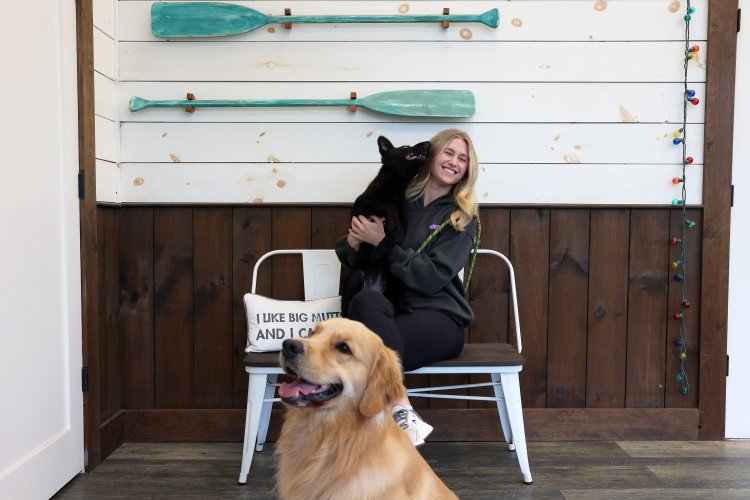

Ben McCanna/Staff Photographer
When Maddie Corbett, 24, walks into work in the morning, she is greeted by hungry, impatient customers, drool running down their chests. They are expecting the best service – and they are also dogs.
This summer, Corbett is a yard attendant at Salty Dog Adventures, a doggy day care in Falmouth. She was already planning on coming to Maine for the summer to visit her family in Sebago after living in Greenville, South Carolina, for two years.
Corbett had worked at Salty Dog for two years while she was a student at the University of Southern Maine and thought the job would be perfect for the summer, so she reached out to her old boss, who “welcomed me with open arms,” Corbett said.
She spent four years working as a certified nurse assistant in hospice and is starting an accelerated nursing program at Clemson University this month. Corbett said that after completing the program, her plan is to work as a cardiac ICU nurse to gain some experience in critical care, and to eventually become a nurse anesthetist.
Corbett decided to use these months in between work and school to visit her family, and get in some other part-time work. She usually works 10 to 12 hours a week.
“It’s such a fun, uplifting job for the summer,” Corbett said. “It can’t get better than this.”
Tad Kane, part-time salesman at Nanuq Kayaks
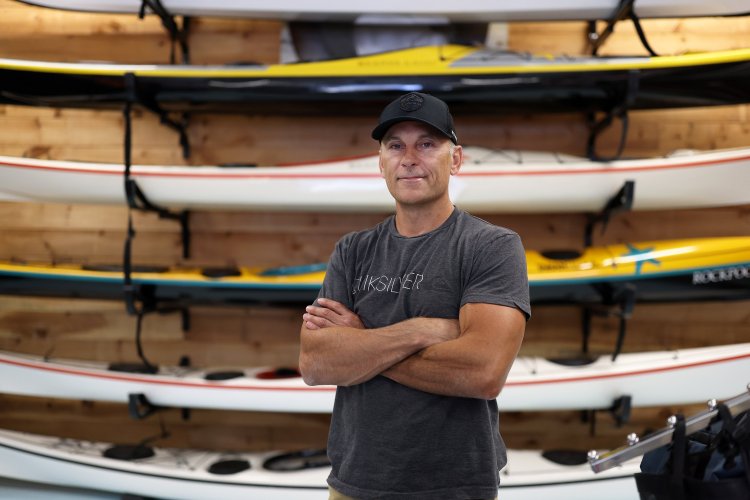

Ben McCanna/Staff Photographer
Tad Kane spends most of the year teaching engineering, business and coding at Kennebunk High School. Now that school’s out, though, his focus is on the water.
Kane, 52, is a part-time employee at Nanuq Kayaks in Portland this summer. This is his first season in the role, talking customers through various products, responding to emails and managing the website. He typically uses his summers to travel with his family, but this year he approached things a bit differently.
“This is where you want to be in the summer,” he said, referring both to Maine and to the kayak shop.
He said he still prioritizes time with his family, but discovered he could also make time to work.
The job is the latest in a varied career. Before teaching, Kane was a glacier guide in Alaska and a geologist in Utah and California. He also has experience as an environmental scientist and in engineering sales.
The business also offers demos, where Kane can take customers out on the water. He also provides lessons for less experienced kayakers, a role that takes advantage of his enthusiasm for teaching.
“Teaching has been utterly unbelievable,” he said. “I love it.”
Ailin Montgomery, curatorial intern for Maine Maritime Museum
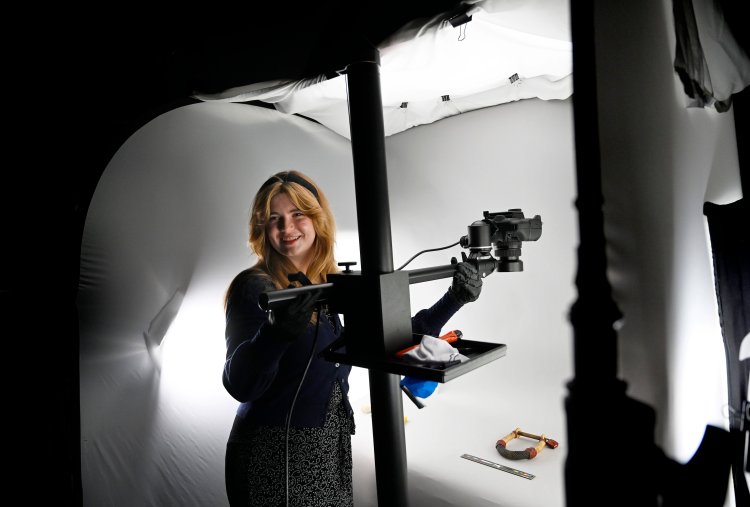

Shawn Patrick Ouellette/Staff Photographer
In the city of ships, Ailin Montgomery, 22, spends her days photographing and displaying artifacts as the Sandra D. Rapp curatorial intern for the Maine Maritime Museum in Bath.
Montgomery just graduated from Augustana University in South Dakota with a double major in history and art and spent her last semester in D.C. as a visitor services intern at the United States Holocaust Memorial Museum. She hopes to continue working in museums.
The job is providing experience and skills that will help her career.
And she loves connecting with Mainers who have helped her learn about the area and feel welcomed.
“Getting to know a new place through the lens of new people is always the best part,” Montgomery said.
A South Dakota native from Sioux Falls, Montgomery was grateful she was able to relocate to Maine for the summer with housing provided. Her pay is funded by Carl Rapp to honor his late wife, who worked in museums.
“I’ve been really soaking up the nature, but the people are amazing, too. Always so kind and outgoing and ready to include you in the Maine of it all,” she said. “You’ve got a new fan of Maine.”
Amélie Pasco and Wren West, summer interns at Brunswick-Topsham Land Trust
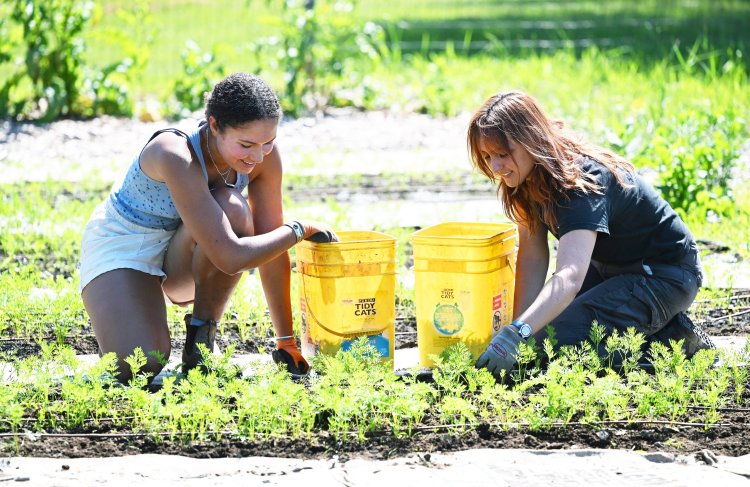

Shawn Patrick Ouellette/Staff Photographer
Wren West and Amélie Pasco begin their days twice a week by getting their hands dirty, planting, weeding and working irrigation systems in the Brunswick-Topsham Land Trust’s community garden.
The two 21-year-olds also staff the organization’s farmers market and help with trail maintenance.
“A lot of the work that we do is outdoors and Maine is so beautiful,” Pasco said. “I feel like it really impacts your mental health.”
When they are inside the office, West said that the interns have personal projects they are working on throughout the duration of the summer. West is compiling a history of the community garden, and Pasco is aiming to create a zine that features the stories of vendors at the market.
West is a rising senior at Bowdoin College and got matched to work at the trust this summer through a fellowship offered by Bowdoin’s environmental studies department.
“I wanted to do something that was local and community-based, and also do work that tangibly makes a difference,” West said.
Pasco is originally from California and will be a senior at McGill University in Montreal. Pasco also got placed at the trust through her college, and, before this internship, had never set foot in Maine. But Pasco said that was a part of the draw.
West and Pasco both said their favorite part of the job has been connecting with local community members and volunteers.
“Maine as a state is just like a small town. Everyone knows everyone,” West said. “It’s really cool to see how everyone’s connected.”
Related Stories










